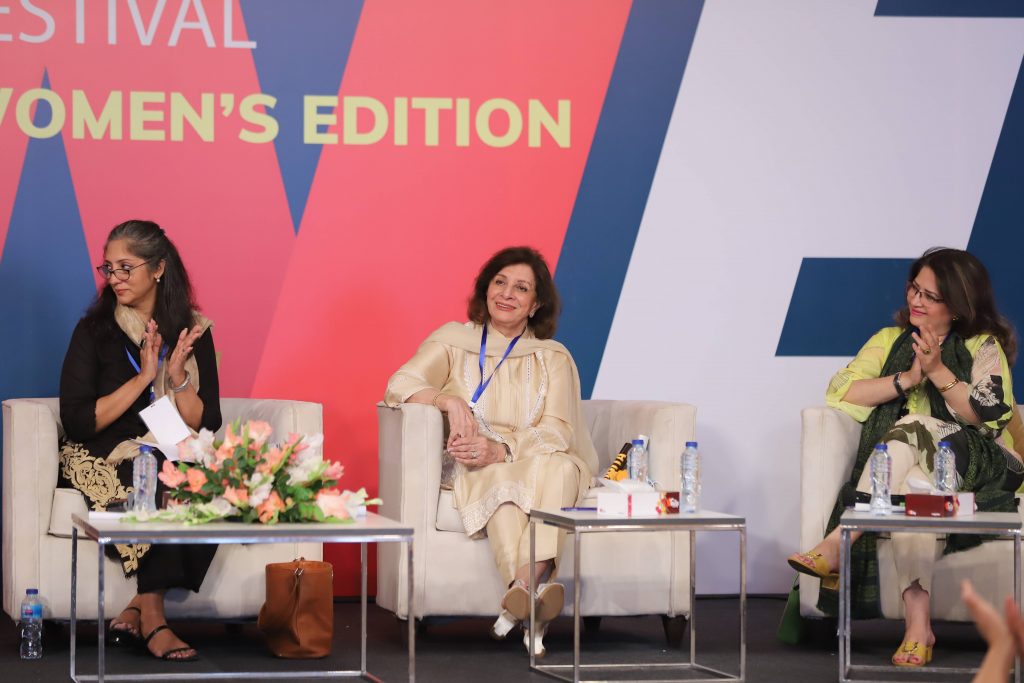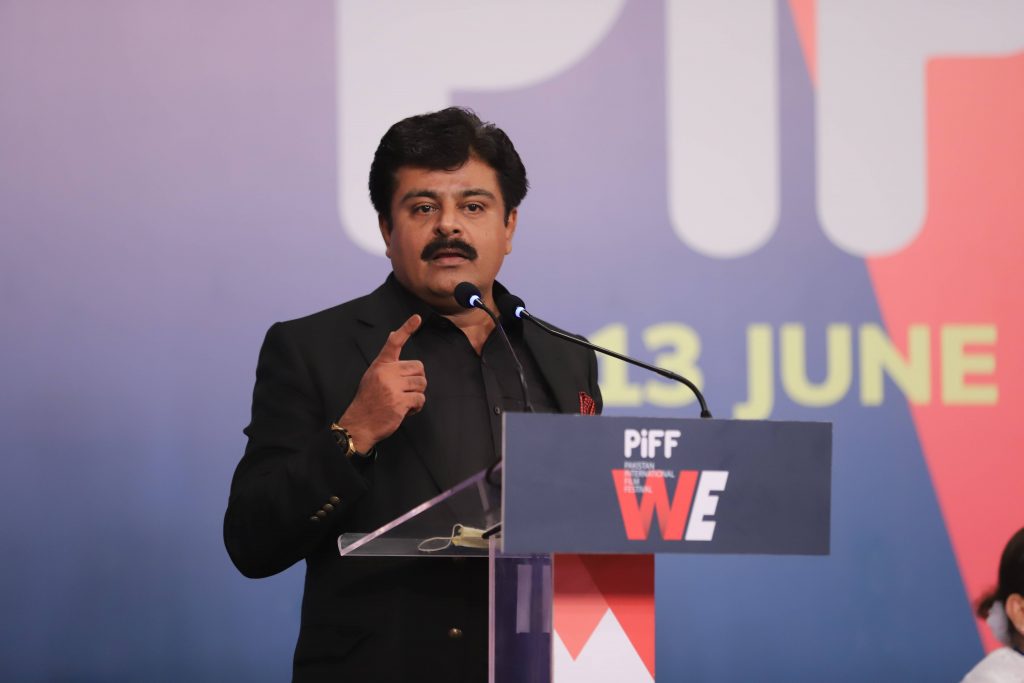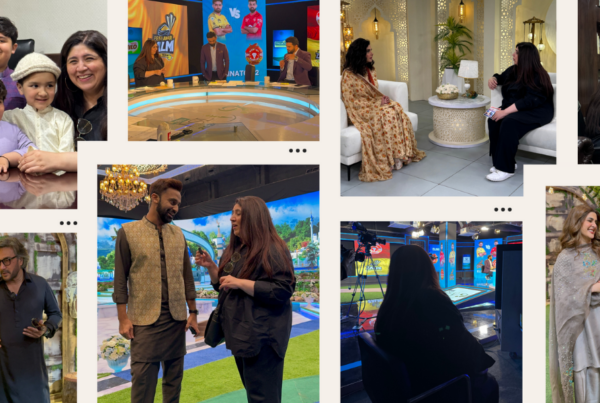The three-day Pakistan International Film Festival (PIFF) Women’s Edition 2021 organized by the Karachi Film Society successfully concluded with a workshop on women entrepreneurship in a creative economy covering how women can learn and further promote businesses and startups in the digital world which was followed by a panel discussion on gender stereotypes in media and what women are doing about it.
The seminar/webinar was moderated by Tazeen Hussain, an associate professor and head of the Department of Communication Design at Indus Valley School of Art and Architecture. The panelists were Sultana Siddiqui, Atiqa Odho, Sangeeta, and Tasneem Ahmar who shared their experience and suggestions regarding discrimination against women and the change that is required.

Tazeen Hussain, Sultana Siddiqui and Atiqa Odho
“When I started my career, the media industry wasn’t considered a safe/good place for women. TV and films were not considered reputable professions for women back then,” shared Sultana Siddiqui who is the President of HUM Network Ltd and recipient of Sitara-I-Imtiaz as well as the President’s Pride of Performance for her outstanding contributions in the field of television/entertainment.
She is a powerhouse and through HUM, she has greatly contributed towards women empowerment in a male-dominated industry. “I always thought that this was a very powerful medium through which I could promote my mindset and bring a change in the society,” she further explained why she still chose this field adding that she feels that her efforts have brought a change. “I encouraged women from my own family to join this profession.”
“I feel when women are at a certain position of power, they do bring change,” adding that now the views surrounding women joining television has changed.
Sangeeta, who is the director of blockbuster Pakistani films such as Society Girl, Mian Biwi Razi, Mutthi Bhar Chawal among several others, also shared her journey over the years. “When I joined the film industry, people did not think highly of the profession. In fact, when at the age of 16, I decided to direct, my own family was trying to convince me to rethink my decision.” However, she threatened that she would quit films entirely if she couldn’t direct them. She added that now the ratio of women in the industry has changed drastically as compared to when she started which is a great achievement.
Addressing harassment on set, Sultana Siddiqui shared Sangeeta was always a strong woman with the focus entirely on her work. “We were shooting at the same location and staying at the same hotel when someone told me how Sangeeta took a stand for herself when some people came and grabbed her by the hand and told her that she’s making films which are against religion. She immediately told them to back off and continued filming.”
Chairperson of FocusPK, entrepreneur, social activist and artist Atiqa Odho added that we live in a country where a woman has led the country. “Benazir Bhutto became the prime minister twice. We live in a country where women have succeeded in the politics of the country, and at a time when women did not get a place in not only the Muslim states but also the West,” she stated adding that despite that when she showed her interest towards a media-related profession she faced resistance too.
She assures that the media industry is a wonderful place for women who want to make a career, adding that many colleagues, regardless of gender, were helpful in her journey so far.
The three panelists strongly advocate that if you are hardworking and good at your craft, nothing can stop you from succeeding. “My team is mostly women-led. The more we encourage our women to come forward, the sooner we can bring a change,” said Sultana Siddiqui explaining how financial independence is very crucial. “Women can multitask and are more efficient than men. We shouldn’t just restrict them to the house with domestic responsibilities. The government should also make them tax-free to support their struggle.”
“There is discrimination and cases of harassment,” accepted Atiqa Odho, “But now we have associations. The overall environment is evolving into a more structured environment and it is a fantastic time to be a part of this industry.”
Tasneem Ahmar, head of UKS Research Centre — a gender-based media advocacy and monitoring organization — and executive producer for Meri Awaz Sunno, felt that a lot still needs to be done and the women in the industry are still not as empowered as we would like to believe. “We are in the company of very powerful women, but that is just a drop in the ocean.”
The panel also discussed the need to change the mindset of the masses through realistic portrayals of strong and successful women characters and changes are required in PEMRA laws. “There must be check and balance to monitor where the complaints are coming from,” stated Atiqa Odho whose drama Pyaar Ke Sadqay also faced a notice. The panel maintained that what is happening in the world is far worse than what is shown on television and the masses must be intelligently educated regarding the evils of society.
The event was attended by the Provincial Minister of Sindh for Culture, Tourism, and Antiquities, Syed Sardar Ali Shah, Senator Sehar Kamran, media fraternity, founding members of the Karachi Film Society and other guests including Bushra Ansari, Zeba Bakhtiar, Urwa Hocane and Shafaat Ali.

Provincial Minister of Sindh for Culture, Tourism, and Antiquities, Syed Sardar Ali Shah
Following the panel discussion, Provincial Minister, Syed Sardar Ali Shah, delivered a keynote speech. He began his speech with a tribute to Shaheed Benazir Bhutto who inspired millions of women across the globe. He appreciated the efforts of KFS board members in organizing such meaningful dialogues and assured his government’s support for the film industry. “We can start an initiative to support the film industry within a year if all the stakeholders can come on one page,” he concluded.
Watch the highlights of the PIFF Day 3 seminar/webinar here:





